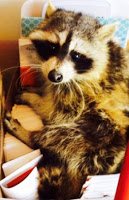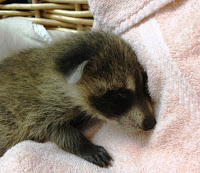Rabid raccoon attacks man

Fairfax County Animal Control officers distributed rabies information to residents of the Kings Park area today after a man was attacked by a rabid raccoon in the 5300 block of Kings Park Drive on Sunday, June 7.
The man was working in his garden around 12:30 p.m. when a raccoon quietly approached him from behind and viciously bit him causing a laceration nearly 12 inches long, according to the Fairfax County Police blog. An animal control officer responding to the incident shot the raccoon after it charged the officer. It was subsequently tested and found to be positive for rabies. The victim was treated and is taking appropriate medications.
Last week there was another rabies incident, involving a dog bit by a rabid fox in the Rose Hill area of Fairfax County.
[Updated June 10: A 75-year-old woman was attacked by a raccoon while walking on a path near the South Run RECenter in Springfield on June 10, the FCPD reports. She stopped to take a picture of a raccoon when it charged at her and bit her several times on her hands, arms, leg and then ran away. It is not known if the raccoon has rabies, but rabid animals are more likely to attack.]
So far, in 2015 there have been 21 positive rabies cases in Fairfax County. There were 10 in 2014.
The vast majority of rabies cases reported to the federal Centers for Disease Control and Prevention occur in wild animals like raccoons, skunks, bats, and foxes. Domestic animals account for less than 10 percent.
If you’re bit, clean the wound with soap and water to lessen the chance of infection, seek medical attention, report the incident to Animal Control, 703-691-2131, and contact the rabies coordinator at the Fairfax County Health Department, 703-246-2433.
Animal Control Services offers some guidelines for people who come across baby raccoons (called kits or cubs) that appear to be orphaned or abandoned. “Although the urge to rescue baby animals is well-intended, survival rates of rehabilitated animals are often low,” it says.
 |
| Baby raccoon |
Raccoon babies that are warm, furred, and uninjured should be left in the area where they were found to allow the mother a chance to reunite with them after dark. Put a laundry basket upside down over the animal (with a light weight on top) and monitor it for a few hours up to a full night to see if the mother returns.
An animal needs help if it has flies, worms, or maggots; was caught by a cat or dog; is bleeding or shows signs of trauma; the parents are known to be dead; is very cold, thin, or weak; or is on the ground unable to move. Contact the Virginia Wildlife Conflict Helpline, 855-571-9003, to find a licensed wildlife rehabilitator.
Do not touch any baby wild animal unless it’s necessary to transport it. If you do need to touch it wear heavy gloves. Keep your hands away from its mouth as there is always potential for rabies among wild animals, including baby raccoons. Place it in a secure, well-ventilated cardboard box lined with an old T-shirt or soft cloth and keep it in a warm, dark, quiet place. Do not give a baby raccoon food or water.


What a terrifying ordeal. I will keep an eye out.
https://www.youtube.com/watch?v=u-C0Av5ICYw